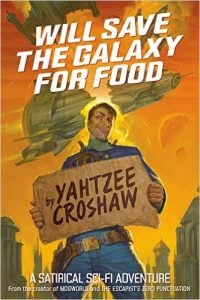 Yahtzee Croshaw is the author of the soon-to-be-released novel ‘Will Save the Galaxy for Food‘. Outside of his writing on novels, he has worked on video games and is also known for his work reviewing games for Zero Punctuation at The Escapist.
Yahtzee Croshaw is the author of the soon-to-be-released novel ‘Will Save the Galaxy for Food‘. Outside of his writing on novels, he has worked on video games and is also known for his work reviewing games for Zero Punctuation at The Escapist.
Science Fiction: Yahtzee, thank you for joining us today. First off I would ask if you could share what “Will Save the Galaxy for Food” is about for those unfamiliar with it?
Yahtzee Croshaw (YC): Galaxy for Food is a satirical sci-fi adventure about a glamorous future age of adventuring on the new frontier of space being cut short by the invention of cheap instantaneous teleportation, which instantly makes all the space adventurers redundant. One such former hero, struggling to make ends meet by flogging stories of his old conquests to tourists, gets caught up in a spiral of disaster and intrigue after he’s asked to pretend to be another, more successful space pilot.
SF: You clearly have a bit of social commentary going on about technology removing jobs. How prominent was this in your mind when putting the novel together?
YC: The march of technology has definitely been a source of annoyance for me as a games journalist, as new updated consoles seem to come out faster and faster and the actual games sacrifice depth and complexity for the sake of staying on the cutting edge of graphics. Then I have the usual crisis of wondering if they really are less deep and complex or if I’m just too nostalgic for the old times and getting left behind. Then I think, no. It must be that everyone else is wrong.
SF: I loved that you went with pulpy science fiction for the theme of the novel. Was this something you had been wanting to do or just how the story evolved?
YC: I’ve always loved pulpy stuff for its…I guess you’d say lack of shame; a lot of sci-fi media these days feels like it needs to be aloof and complex and gritty, but there’s an innocence to pulp that makes it more fun to joke around with. When I was first writing Galaxy for Food, the sci-fi was a little straighter at first—no wacky alien races, the star pilots’ role in the universe was a bit blurrier—until I realized that the joke worked better if I leaned as pulpy as possible. A Flash Gordon or Captain Kirk–like hero is a concrete figure—the square jaw, the green-skinned alien babe on one arm—and it’s funnier for me to think of an image so timeless and indestructible being suddenly made redundant.
SF: With video game creation being part of your past, what type of game would you like Will Save the Galaxy for Food to end up as if that ever happened? (Personally, I could see it as a classic point-and-click adventure in the style of Maniac Mansion and The Secret of Monkey Island.)
YC: Funnily enough, I was toying with the premise as a top-down adventure game for a while (with more of an RPG leaning—the concept of a redundant space hero seeking any kind of menial busywork would probably fit a standard side-questing scenario), but eventually I felt like it worked better as a book. Plus I wouldn’t have to animate sprites as much.
SF: Is Will Save the Galaxy for Food a standalone novel or something we could expect more of in the future?
YC: It’s open to sequels, and I’m definitely giving serious thought to going the trilogy route. I know how the trilogy would go, plotwise. Maybe I’ll wait to see the response.
SF: This is your third novel being published through Dark Horse. How has your relationship been with the company so far?
YC: It’s gone very well, I’d say. Dark Horse is a company founded on creators’ rights, and I’ve always felt like we’ve put out good end products together.
SF: Have you considered going back and turning any of the past video games which you worked on into novels?
YC: If there’s one thing I’ve learned from writing, game making, and game criticism, it’s that some stories are better suited to one medium than another. Interactive stories are told with different rules. I wouldn’t rule out something in the same universe, but whether it was a game or a book, a story’s done when it’s told. I’d get very little fulfillment adapting my own stuff.
SF: What is your ideal writing environment?
YC: At home, near enough to the kitchen that the fridge is within convenient pacing distance.
SF: If possible, could you share what you have in the works next?
YC: Well, the production process for Galaxy for Food has taken long enough that I’ve had time to finish the first draft of another unrelated novel idea, so I’ll probably pitch that to someone. Otherwise, more games, more web videos, and hopefully, at some point, sleep.
SF: Is there anything further that you would like to share with our readers or your fans?
YC: Stay cool, reach for the stars, and remember to hydrate more if your urine becomes highly colored.
![]()
Stuart Conover is an author, blogger, and all around geek. When not busy being a father and husband he tries to spend as much time as possible immersed in comic books, science fiction, and horror! Would you like to know more? Follow him on Twitter!
